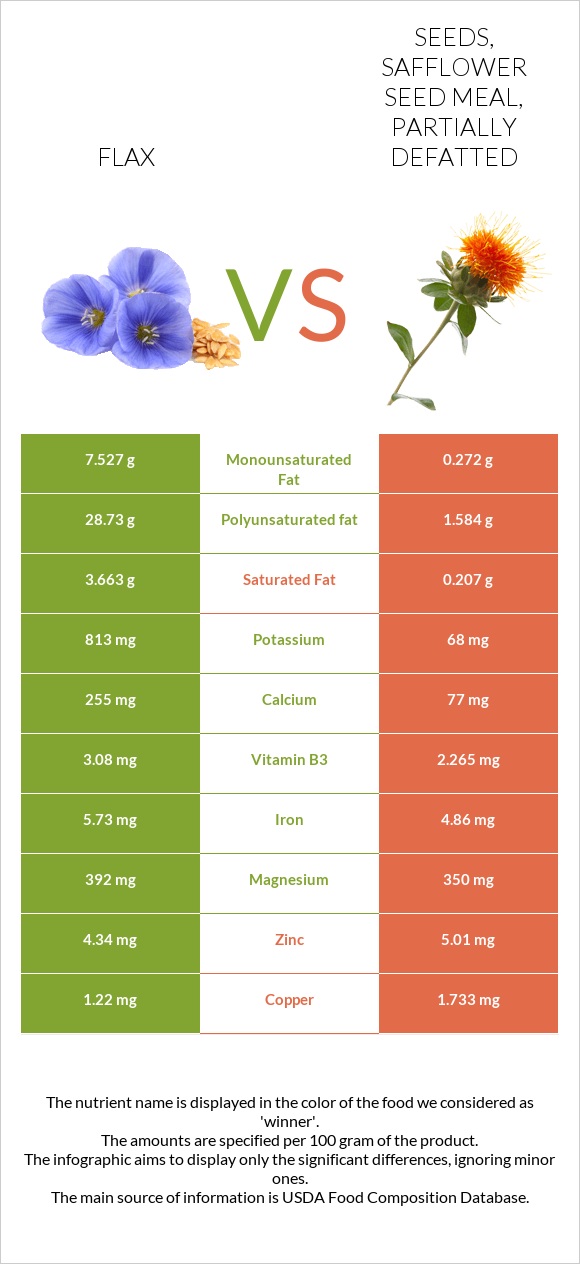Flax seeds vs. Seeds, safflower seed meal, partially defatted — In-Depth Nutrition Comparison
Compare
Important differences between flax seeds and seeds, safflower seed meal, partially defatted
- Flax seeds have more vitamin B1, potassium, manganese, and calcium; however, seeds, safflower seed meal, partially defatted is richer in vitamin B5, copper, vitamin B6, vitamin B2, and folate.
- Seeds, safflower seed meal, partially defatted's daily need coverage for vitamin B5 is 60% more.
- Flax seeds contain 18 times more saturated fat than seeds, safflower seed meal, partially defatted. Flax seeds contain 3.663g of saturated fat, while seeds, safflower seed meal, partially defatted contains 0.207g.
The food varieties used in the comparison are Seeds, flaxseed and Seeds, safflower seed meal, partially defatted.
Infographic

Infographic link
Mineral Comparison
Mineral comparison score is based on the number of minerals by which one or the other food is richer. The "coverage" charts below show how much of the daily needs can be covered by 300 grams of the food.
| Contains more MagnesiumMagnesium | +12% |
| Contains more CalciumCalcium | +231.2% |
| Contains more PotassiumPotassium | +1095.6% |
| Contains more IronIron | +17.9% |
| Contains more ManganeseManganese | +24.2% |
| Contains more SeleniumSelenium | +∞% |
| Contains more CopperCopper | +42% |
| Contains more ZincZinc | +15.4% |
| Contains less SodiumSodium | -90% |
Vitamin Comparison
Vitamin comparison score is based on the number of vitamins by which one or the other food is richer. The "coverage" charts below show how much of the daily needs can be covered by 300 grams of the food.
| Contains more Vitamin CVitamin C | +∞% |
| Contains more Vitamin EVitamin E | +∞% |
| Contains more Vitamin B1Vitamin B1 | +42.6% |
| Contains more Vitamin B3Vitamin B3 | +36% |
| Contains more Vitamin KVitamin K | +∞% |
| Contains more Vitamin AVitamin A | +∞% |
| Contains more Vitamin B2Vitamin B2 | +155.9% |
| Contains more Vitamin B5Vitamin B5 | +305.7% |
| Contains more Vitamin B6Vitamin B6 | +145.5% |
| Contains more FolateFolate | +82.8% |
All nutrients comparison - raw data values
| Nutrient |  |
 |
DV% diff. |
| Polyunsaturated fat | 28.73g | 1.584g | 181% |
| Fiber | 27.3g | 109% | |
| Fats | 42.16g | 2.39g | 61% |
| Vitamin B5 | 0.985mg | 3.996mg | 60% |
| Copper | 1.22mg | 1.733mg | 57% |
| Vitamin B6 | 0.473mg | 1.161mg | 53% |
| Selenium | 25.4µg | 46% | |
| Vitamin B1 | 1.644mg | 1.153mg | 41% |
| Protein | 18.29g | 35.62g | 35% |
| Potassium | 813mg | 68mg | 22% |
| Manganese | 2.482mg | 1.998mg | 21% |
| Vitamin B2 | 0.161mg | 0.412mg | 19% |
| Calcium | 255mg | 77mg | 18% |
| Folate | 87µg | 159µg | 18% |
| Monounsaturated fat | 7.527g | 0.272g | 18% |
| Saturated fat | 3.663g | 0.207g | 16% |
| Choline | 78.7mg | 14% | |
| Iron | 5.73mg | 4.86mg | 11% |
| Calories | 534kcal | 342kcal | 10% |
| Magnesium | 392mg | 350mg | 10% |
| Carbs | 28.88g | 48.73g | 7% |
| Zinc | 4.34mg | 5.01mg | 6% |
| Vitamin B3 | 3.08mg | 2.265mg | 5% |
| Vitamin K | 4.3µg | 4% | |
| Vitamin E | 0.31mg | 2% | |
| Vitamin C | 0.6mg | 0mg | 1% |
| Phosphorus | 642mg | 638mg | 1% |
| Sodium | 30mg | 3mg | 1% |
| Net carbs | 1.58g | 48.73g | N/A |
| Sugar | 1.55g | N/A | |
| Vitamin A | 0µg | 2µg | 0% |
| Tryptophan | 0.297mg | 0.403mg | 0% |
| Threonine | 0.766mg | 1.29mg | 0% |
| Isoleucine | 0.896mg | 1.579mg | 0% |
| Leucine | 1.235mg | 2.54mg | 0% |
| Lysine | 0.862mg | 1.176mg | 0% |
| Methionine | 0.37mg | 0.625mg | 0% |
| Phenylalanine | 0.957mg | 1.774mg | 0% |
| Valine | 1.072mg | 2.258mg | 0% |
| Histidine | 0.472mg | 0.995mg | 0% |
| Omega-6 - Eicosadienoic acid | 0.007g | N/A |
Macronutrient Comparison
Macronutrient breakdown side-by-side comparison
Protein:
18.29 g
Fats:
42.16 g
Carbs:
28.88 g
Water:
6.96 g
Other:
3.71 g
Protein:
35.62 g
Fats:
2.39 g
Carbs:
48.73 g
Water:
6.41 g
Other:
6.85 g
| Contains more FatsFats | +1664% |
| Contains more ProteinProtein | +94.8% |
| Contains more CarbsCarbs | +68.7% |
| Contains more OtherOther | +84.6% |
~equal in
Water
~6.41g
Fat Type Comparison
Fat type breakdown side-by-side comparison
Saturated fat:
Sat. Fat
3.663 g
Monounsaturated fat:
Mono. Fat
7.527 g
Polyunsaturated fat:
Poly. Fat
28.73 g
Saturated fat:
Sat. Fat
0.207 g
Monounsaturated fat:
Mono. Fat
0.272 g
Polyunsaturated fat:
Poly. Fat
1.584 g
| Contains more Mono. FatMonounsaturated fat | +2667.3% |
| Contains more Poly. FatPolyunsaturated fat | +1713.8% |
| Contains less Sat. FatSaturated fat | -94.3% |